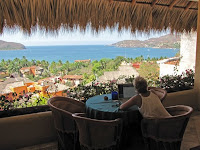 We spent the day on beautiful Playa La Ropa, realizing that we've seldom done so, favoring walks to town and afternoons on Playa Principal. We enjoyed watching a fairly good Saturday turnout of beach-goers, including a smattering of para-sailers, hobie-catters and boogey-boarders. We walked to both ends of the beach, but mostly just sat and savored our last full day of warmth, fragrance and color.
We spent the day on beautiful Playa La Ropa, realizing that we've seldom done so, favoring walks to town and afternoons on Playa Principal. We enjoyed watching a fairly good Saturday turnout of beach-goers, including a smattering of para-sailers, hobie-catters and boogey-boarders. We walked to both ends of the beach, but mostly just sat and savored our last full day of warmth, fragrance and color. At low tide, I was able to get well into the rock formation separating Playas La Ropa and Madera, and found some little tidal pools teeming with life. Jet black anemonies, Sally Lightfoot crabs and some tiny irridescent blue fish.
At low tide, I was able to get well into the rock formation separating Playas La Ropa and Madera, and found some little tidal pools teeming with life. Jet black anemonies, Sally Lightfoot crabs and some tiny irridescent blue fish. We had our last dinner at La Gula (the gluttony) on Calle Adelita. We'd heard a few positive comments about it on ZihuaRob's message board, but it was mostly a shot in the dark. It turned out to be our very favorite meal of our stay thanks to the combination of good food, friendly, efficient service, and creative, pleasant atmosphere.
We had our last dinner at La Gula (the gluttony) on Calle Adelita. We'd heard a few positive comments about it on ZihuaRob's message board, but it was mostly a shot in the dark. It turned out to be our very favorite meal of our stay thanks to the combination of good food, friendly, efficient service, and creative, pleasant atmosphere.Afterwards, we walked to the zocalo to join a modest, fairly quiet turnout of townsfolk for a basketball game and a stroll around the square looking for perritos to pet. Then it was home early to start packing and get a good night's sleep for the long journey ahead.
Some reflections written this morning:
 I’m trying to process the ache I’m feeling in my chest this morning as I look out on Zihuatanejo Bay. The little panga launches are criss-crossing the bay delivering worshippers of sun and cerveza to Playa las Gatas as they do every day. The air is still deliciously calm, but by noon sun and sea and mountains will conspire to heat it and then pump welcome breezes. The staccato “mock…mock” of two men playing tennis rises up from the Tides resort a couple of blocks away. Long-tailed grackles and yellow winged caciques fly by below me so I can see their splendid tops. A murmer of busy sounds rises from the street: cars whisper discreetly; trucks grumble at the steep climbs; and strains of happy ranchero music exude from pick-ups and work sites.
I’m trying to process the ache I’m feeling in my chest this morning as I look out on Zihuatanejo Bay. The little panga launches are criss-crossing the bay delivering worshippers of sun and cerveza to Playa las Gatas as they do every day. The air is still deliciously calm, but by noon sun and sea and mountains will conspire to heat it and then pump welcome breezes. The staccato “mock…mock” of two men playing tennis rises up from the Tides resort a couple of blocks away. Long-tailed grackles and yellow winged caciques fly by below me so I can see their splendid tops. A murmer of busy sounds rises from the street: cars whisper discreetly; trucks grumble at the steep climbs; and strains of happy ranchero music exude from pick-ups and work sites.I guess this is the ache. Knowing that, tomorrow, we’ll have to leave this wonderful place, these friendly, gracious, hard-working people, and this lifestyle that we’re so privileged—nearly embarassed—to be able to enjoy.
 Zihuatanejo is not easy to pigeonhole. There’s still the aura of the sleepy fishing village about it. But mostly it’s about tourists and transplants now. Still, not everyone’s content just to wait on tourists who want a taste of their quaint village. Some aspire to go to school, to learn a trade or to own a business. So there’s conflict, just like there is in other beautiful places, between growing where one is planted and looking for a bigger pot; between short-sighted opportunity and wiser, more enduring values.
Zihuatanejo is not easy to pigeonhole. There’s still the aura of the sleepy fishing village about it. But mostly it’s about tourists and transplants now. Still, not everyone’s content just to wait on tourists who want a taste of their quaint village. Some aspire to go to school, to learn a trade or to own a business. So there’s conflict, just like there is in other beautiful places, between growing where one is planted and looking for a bigger pot; between short-sighted opportunity and wiser, more enduring values.We’ve seen first-hand the effects of the global economic crisis, combined with the recent bad press about the narco-violence that’s finally beginning to irritate the underbelly of Zihua. In our villa complex, San Sebastian, most of the nine units have sat vacant for the two weeks we’ve been here. We’ve often been the only, or nearly so, customers at restaurants. A fishing charter can be had for a song. A waiter begged us to bring him some of our fish if we went deep sea fishing again so he could provide his family with some animal protein more than once a week. Today, a beach vendor thanked us up and down for being his first customers. It was well after noon.
Despite the bad press and a few doom-sayers locally, the experience of the average tourist (or expat for that matter) remains pretty innocent. Aside from opting sometimes for a cab after dark and making sure our villa’s locked, we still have not felt anything but safe here.

But the economy? That hits everyone. We’ve (okay, mostly Sally) tried to be generous, tipping well, buying a few things we don’t really need, giving outright gifts to people who’ve touched us. We just hope they can hang on until things pick up again or, better yet, until they see an opportunity to realize a more prosperous life.
 That said, I do not feel sorry for most of the Mexicans we’ve met here. With very few exceptions, they seem happy in their own skin. They’re very proud of themselves, their families, their town and their country. But, as in our own country, they’re exploited by a powerful, corrupt elite, and every social and economic institution seems designed to keep it that way.
That said, I do not feel sorry for most of the Mexicans we’ve met here. With very few exceptions, they seem happy in their own skin. They’re very proud of themselves, their families, their town and their country. But, as in our own country, they’re exploited by a powerful, corrupt elite, and every social and economic institution seems designed to keep it that way.We will count the days to our next visit to Zihuatanejo. Part of us hopes to see the familiar faces of the many wonderful residents we’ve met. And part of us hopes they’ve been able to move on to bigger and better things.
























